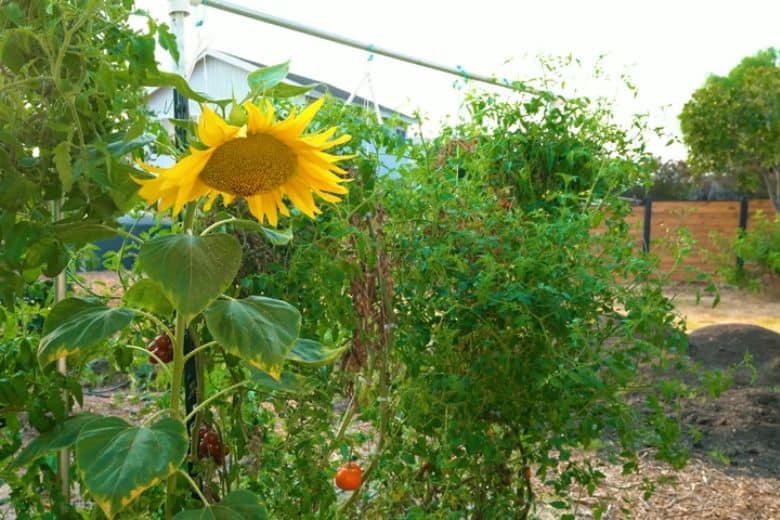
Ever considered the harmonious fusion of towering sunflowers with the vibrant raspberry bushes in your garden? Are you intrigued by the idea, but are left wondering, “Can I plant sunflowers next to raspberries?” We’ve all had that moment of questioning whether different species of plants can thrive together, especially when it comes to planting them side by side in our beloved gardens.
The short and simple answer to your query is ‘Yes’, you certainly can plant sunflowers next to raspberries. Sunflowers and raspberries are compatible companions in a garden setting. They share similar growing conditions and even benefit from each other’s presence.
But why exactly are these two seemingly diverse species such good companions? What makes them the perfect duo in your garden? Well, we’re glad you asked. Our comprehensive article will take you through the science behind companion planting, the mutual benefits these plants offer each other, and the expert guidelines for optimal growth. Get ready to dive into the verdant world of sunflowers and raspberries and let’s cultivate a blooming friendship right in your backyard!
Why Sunflowers and Raspberries?
Sunflowers are magnificent bloomers that add an aesthetic appeal to your garden. They also serve a more utilitarian role when paired with raspberry plants. Their towering stalks act as a natural trellis for raspberries, supporting their growth. Sunflowers also help in attracting pollinators, which boosts raspberry yields.
Raspberries, on the other hand, are low-growing shrubs. They grow well in the partial shade provided by sunflowers, which protect them from extreme sun exposure. The raspberries’ dense foliage serves as a deterrent for pests that could otherwise attack sunflowers.
Understanding Companion Planting
Companion planting is a millennia-old practice in agriculture where different species of plants are grown together to the mutual benefit of both. It’s a natural way to enhance your garden, improving soil fertility, controlling pests, and promoting overall plant health.
Can I Plant Sunflowers Next to Raspberries?
In a nutshell, yes, you can plant sunflowers next to raspberries. However, it’s crucial to understand each plant’s requirements and adjust your gardening strategy to ensure both can thrive.
The Life Cycle of Sunflowers
Sunflowers, with their towering stems and radiant blooms, are annuals that live for a single growing season. From seed to mature plant, we’ll delve into the fascinating journey these sunny blossoms undertake every year.
The Life Cycle of Raspberries
Raspberries, on the other hand, are perennial plants that bear fruit year after year. We’ll look into the growth pattern of these delicious berries, setting the stage for effective companion planting.
Benefits of Planting Sunflowers Next to Raspberries
From providing necessary shade to attracting beneficial insects, planting sunflowers next to raspberries comes with several benefits. We’ll explore these advantages in detail, guiding you on the path to a thriving garden.
Drawbacks of Planting Sunflowers Next to Raspberries
Like any gardening decision, planting sunflowers next to raspberries also has its drawbacks. We’ll walk you through potential challenges and how to manage them effectively.
Optimal Conditions for Sunflowers and Raspberries
Each plant has its own set of needs regarding sunlight, water, and soil conditions. We’ll compare the ideal growing conditions for both sunflowers and raspberries to ensure they can coexist successfully in your garden.
Common Issues when Growing Sunflowers and Raspberries
Despite our best efforts, sometimes our plants run into problems. From nutrient deficiencies to weather stress, we’ll identify common issues that can plague sunflowers and raspberries.
Planting the Sunflowers and Raspberries
Start by planting sunflowers first. Choose a location with full sun exposure and ample space. Ensure that the soil is loose and well-drained.
Plant the seeds about 1 inch deep and space them 6 feet apart. Water the seeds thoroughly.
After the sunflowers have sprouted and reached a considerable height, it’s time to plant raspberries.
Space them around 2 feet apart in rows that are 6 feet apart, adjacent to the sunflowers.
This ensures that the sunflowers can offer support and shade.
Caring for Your Plants
Proper care is essential to reap the benefits of planting sunflowers next to raspberries. Regular watering is crucial as both plants require adequate moisture to thrive. Apply a layer of mulch around the base of the plants to retain moisture and control weeds.
Pest control is equally important. Monitor your plants for any signs of disease or pest infestation. Employ organic pest control methods to keep your garden healthy.
Harvesting Your Crops
Come harvest time, your labor pays off. Sunflower seeds are ready to harvest when the flower heads droop and the back turns brown. For raspberries, the fruit is ripe when it easily detaches from the plant.
Frequently Asked Questions
Can sunflowers and raspberries be planted together in all climates?
Answer: Not all climates are suitable for both. Both plants prefer full sun and well-drained soil, but sunflowers are more drought-tolerant, and raspberries may require a bit more water.
How far should I space sunflowers from raspberry bushes?
Answer: Spacing will depend on the variety of sunflower. Generally, sunflowers should be planted far enough away so they won’t overshadow the raspberries.
Do I need to protect my raspberries from birds attracted by sunflowers?
Answer: Yes, if you notice birds are becoming a problem, consider using bird netting over your raspberries.
What other plants are good companions for raspberries?
Answer: Good companions for raspberries include yarrow, garlic, chives, and marigold.
What other plants can I plant with sunflowers?
Answer: Good companions for sunflowers include corn, cucumber, and melons.
Conclusion
Companion planting is a natural and beautiful way to create a balanced garden. Planting sunflowers next to raspberries can be a delightful addition to your garden, given proper planning and care. Remember, the ultimate goal is a thriving, vibrant garden that provides joy and bounty.






